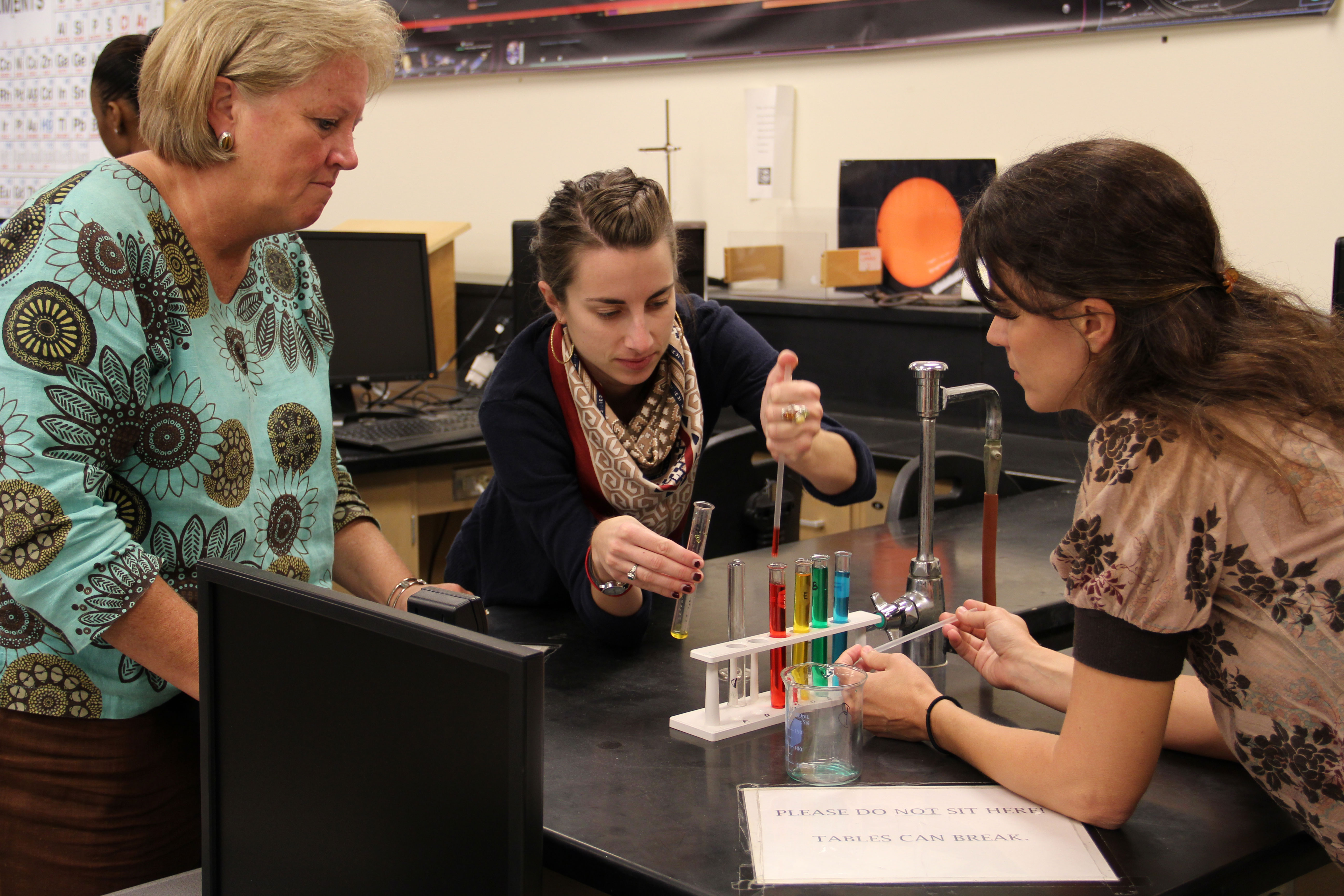The Virginia Department of Education has awarded faculty members in the University of Virginia’s Curry School of Education teacher education program and colleagues in U.Va.’s College of Arts & Sciences two grants to support Virginia elementary and secondary teachers of science and mathematics.
One trio will seek to boost the teaching of physics in middle and high schools, while the other group of faculty members work to boost the teaching of math and science to mixed classes of mainstream and special education students in elementary and middle schools.
Led by Richard Lindgren, research professor of physics, Frackson Mumba, associate professor of science education, and Jennifer Maeng, assistant professor of science education, the first project aims to increase middle and high school teachers’ knowledge of physics and aid these teachers to teach that content in their classes more effectively. The grant will also aim to improve the use of technology in middle and high school physics classrooms.
“We know that by current measures, students are not achieving as highly in critical areas of science as we would like to see,” Mumba said. “The goal of this program is to enhance these physics teachers’ ability to effectively communicate potentially complex elements of physics and to become more familiar with the breadth of technologies that, when used effectively, can help them achieve that goal.”
The $227,000 grant will fund two weeks of professional development for 32 teachers during the summers of 2014 and 2015. The program will run in both the Piedmont and Hampton Roads areas.
Participating teachers will spend the first summer learning specifically about the scientific principles behind light and optics. The following summer, they will focus on electricity and magnetism. Participants will leave these sessions with lesson plans and ideas to implement the following school year.
“By partnering with Richard Lindgren, we can offer these teachers expertise in both the content of physics, but also the teaching of physics,” Mumba said.
The faculty members also are preparing ways to connect with the teachers during the school year.
“We have planned follow-up activities during the school year that include professional development focused on reflective teaching,” Maeng said. “We will be encouraging the teachers to pay close attention as they implement a new lesson plan, reflect and consider what went well, what might need tweaking.”
The second group will focus on increasing elementary and middle school math and science teachers’ content knowledge and teaching skills. Candace Lutzow-Felling of U.Va.’s Blandy Experimental Farm, along with Michael Kennedy, assistant professor of special education, and Robert H. Tai, associate professor of science education, and Mumba will lead the project.
The group also aims to help teachers integrate technology into classrooms with both general and special education students. The practice of “inclusion,” in which special education students learn alongside regular students in mainstream classrooms, is widespread across Virginia.
“Students with disabilities are often included in general education courses,” Kennedy said. “As a result, content specialists and special educators are required to work together to help all students learn and succeed. However, this is easier said than done.
“The goal is to find and implement effective instructional approaches that support students’ individual needs while maintaining the level of rigor required in secondary-level courses like science.”
The project is structured similarly to the first: The grant will fund a two-week professional development experience for teachers during the next two summers, with an ultimate goal of reaching 60 teachers.
Administrators will identify teams of “teacher leaders” to participate in the program. These teams will include one math teacher, one special education teacher and one science teacher. Upon completing these two weeks of professional development, the teams will serve as teacher-trainers in their own schools.
“Teachers in these inclusion classrooms are not only expected to be content experts in mathematics and science, they are also expected to effectively relay that content to students with a wide range of disabilities, such as specific learning disabilities in areas related to reading, intellectual disabilities or high-functioning autism,” Kennedy said. “Often, general education teachers receive a minimal amount of training to convey their specific content to students with learning challenges. The aim of this professional development program is to remedy that situation.”
Curry School faculty members also are working to ensure that their students in the school’s teacher education program are trained with these skills before entering their first classrooms. These students are not only learning about teaching students with a range of needs, but also are learning techniques to engage students in meaningful activities in the classroom.
“One consideration often overlooked in light of the state requirements and high-stakes testing is the importance of engaging children in the lessons through the learning activities,” Tai said. “When children are engaged, teaching and learning flow. A central component of our work with teachers, both in-service and pre-service, is to engage them in the development of lessons that incorporate a variety of learning activities with the aim of engaging the students’ interest.”
Mumba said that teachers in “inclusion” math and science classrooms have access to many free tools to help them create engaging learning experiences.
“There are a tremendous amount of technologies available to teachers, from podcasts to computer simulations and even videos on YouTube, that teachers simply do not have the time to find,” Mumba said. “An exciting part of our job is unearthing these free resources and sharing them with teachers.”
At the conclusion of this summer’s first two-week session, participants will be prepared to present their latest work at Virginia Association of Science Teachers conferences, like their colleagues participating in the first project. The U.Va. faculty team also hopes to identify leaders from that group who will be invited back to lead sessions during the 2015 summer program.
Media Contact
Article Information
May 1, 2014
/content/uva-faculty-win-grants-boost-stem-education-virginia-public-schools

